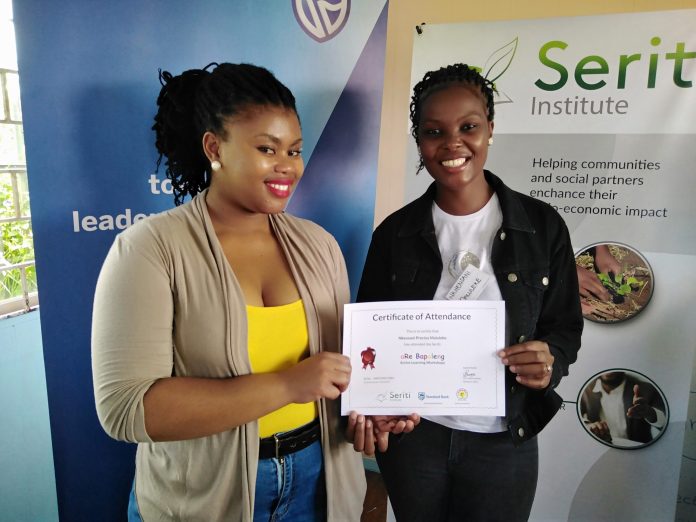
- Research shows that almost half (46%) of South African children were living in households belonging to the lower household income quintiles (quintiles 1 and 2).
- High numbers of our children are not attending ECD centres or parents cannot afford it.
- Adequately equipped parents get to play an active role in their children’s development.
- Seriti Institute’s aRe Bapaleng programme has equipped over 300 parents and caregivers with over 1000 child benefactors who have reported positive changes in the children’s social and emotional development.
The Early Childhood Development (ECD) media report released by Statistics South Africa February 2021 states that South Africa’s effort in expanding children’s access to education has primarily benefitted school-age children. Close to 99% of children aged 6-13-years-old old, attended school in 2018. In the age group 3-6-year-olds, which encompasses children who ought to be in pre-school, Grade R in the first year of primary school, around 43% of 3-year-olds, close to 30% of 4-year-olds, close to 13% of 5-year-olds and 3% of 6-year-olds were not in educational institutions in 2018.
“If the statistics mentioned by the report are anything to go by, then it is a clear indication that a high number of our children are not attending ECD centres. The number is quite likely to be higher now due to the COVID-19 pandemic, which raises the question: who is taking care of these children and educating them at home?” says Dumile Pretty Ndimande, the aRe Bapaleng (Let’s Play) ECD Programme Manager at Seriti Institute.
“As Seriti Institute, we have identified that the strengthening of parents and primary caregivers to be of critical importance in this area. We have seen that when parents are adequately equipped, they get to play an active role in their children’s development. This supports and prepares children for non-centre based ECD programmes and ECD centres. Therefore, it is so important for ECD stimulation to begin at home.”
The Statistics South Africa report from February 2018 (Or should we say “A recent South African Study”), said a breakdown by monthly household income quintile revealed that close to half of the children in the lower household income quintiles did not attend any educational centre, while 40% of the children in the highest household income quintile attended out-of-home early learning programmes. Children in mostly black African families received suboptimal stimulation as 31% were never encouraged to imitate daily activities and 35,2% were never given answers when they pointed at objects and asked for explanations.
This shows that several children were growing up in home environments that did not provide for communication or play to stimulate learning.
Ndimande adds, “we saw how unengaged children were during the COVID-19 hard lockdown and parents and primary caregivers had no idea how to stimulate their children. With the lack of access to ECD centres, it is evident that we cannot solely depend on them for children’s much need stimulation whereas they spend so much time at home.”
Since its inception in 2020, Seriti Institute’s aRe Bapaleng programme funded by Standard Bank SA has reached over 400 parents and caregivers with over 1000 child benefactors who have reported positive changes in the children’s social and emotional development. Parents and primary caregivers now understand that playing gives children the important scope to learn and grow. They are now confident enough to better support their children’s various developmental needs, interact and communicate with their children and to demonstrate love and compassion towards them.
“Through aRe Bapaleng’s Active Learning Workshops and Caregiver Network, parents and primary caregivers have learned the importance of prioritising quality time with their children, including playing and engaging with them in a more attentive manner. Some parents and primary caregivers started allowing their children the freedom to explore their surroundings without interference, which contributes to creativity and independence,” she expands.
Many primary caregivers reported that they increased the time spent playing and talking with their children which improved their interaction and solidified the bond between them. More parents and primary caregivers began creating schedules and routines for their children that had not existed before, to establish a heathy rhythm in the home.
“I learnt to spend time with my children and trying some of the educational games I have learnt, really helped my son as I was struggling to get him to do his schoolwork, because he struggled with short concentration” shares Khentsane Maluleke a mother of a two-year-old who participated in the aRe Bapaleng Active Learning workshops. (picture on the attached, right)
Programmes such as aRe Bapaleng are key in ensuring an increase in school readiness of children in ECD whilst the sector finds better methods and funding to secure the future of our children.
“By providing training material, books, educational tools and toys to parents and primary caregivers, we are contributing towards providing access to quality ECD by 2030”. concludes Ndimande.
By: Dumile Pretty Ndimande, the aRe Bapaleng (Let’s Play) ECD Programme Manager at Seriti Institute
Issued by:
Refilwe Pico
Communications Practitioner
Seriti Institute
Tel:011 2627700
Email: [email protected]











